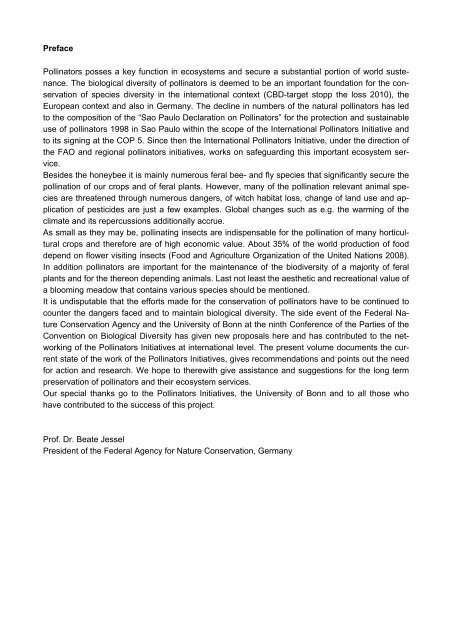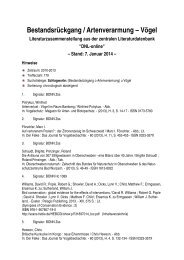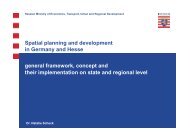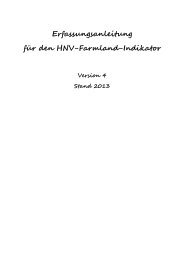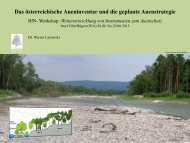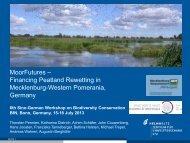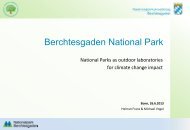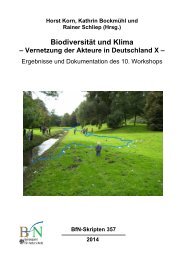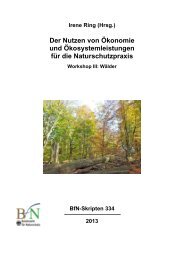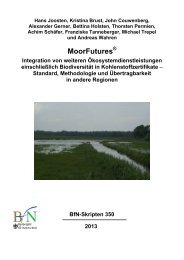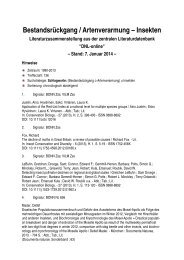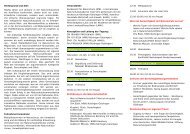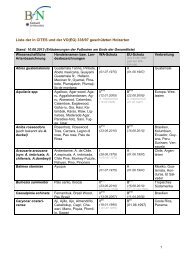Caring for Pollinators - Bundesamt für Naturschutz
Caring for Pollinators - Bundesamt für Naturschutz
Caring for Pollinators - Bundesamt für Naturschutz
You also want an ePaper? Increase the reach of your titles
YUMPU automatically turns print PDFs into web optimized ePapers that Google loves.
Preface<br />
<strong>Pollinators</strong> posses a key function in ecosystems and secure a substantial portion of world sustenance.<br />
The biological diversity of pollinators is deemed to be an important foundation <strong>for</strong> the conservation<br />
of species diversity in the international context (CBD-target stopp the loss 2010), the<br />
European context and also in Germany. The decline in numbers of the natural pollinators has led<br />
to the composition of the “Sao Paulo Declaration on <strong>Pollinators</strong>” <strong>for</strong> the protection and sustainable<br />
use of pollinators 1998 in Sao Paulo within the scope of the International <strong>Pollinators</strong> Initiative and<br />
to its signing at the COP 5. Since then the International <strong>Pollinators</strong> Initiative, under the direction of<br />
the FAO and regional pollinators initiatives, works on safeguarding this important ecosystem service.<br />
Besides the honeybee it is mainly numerous feral bee- and fly species that significantly secure the<br />
pollination of our crops and of feral plants. However, many of the pollination relevant animal species<br />
are threatened through numerous dangers, of witch habitat loss, change of land use and application<br />
of pesticides are just a few examples. Global changes such as e.g. the warming of the<br />
climate and its repercussions additionally accrue.<br />
As small as they may be, pollinating insects are indispensable <strong>for</strong> the pollination of many horticultural<br />
crops and there<strong>for</strong>e are of high economic value. About 35% of the world production of food<br />
depend on flower visiting insects (Food and Agriculture Organization of the United Nations 2008).<br />
In addition pollinators are important <strong>for</strong> the maintenance of the biodiversity of a majority of feral<br />
plants and <strong>for</strong> the thereon depending animals. Last not least the aesthetic and recreational value of<br />
a blooming meadow that contains various species should be mentioned.<br />
It is undisputable that the ef<strong>for</strong>ts made <strong>for</strong> the conservation of pollinators have to be continued to<br />
counter the dangers faced and to maintain biological diversity. The side event of the Federal Nature<br />
Conservation Agency and the University of Bonn at the ninth Conference of the Parties of the<br />
Convention on Biological Diversity has given new proposals here and has contributed to the networking<br />
of the <strong>Pollinators</strong> Initiatives at international level. The present volume documents the current<br />
state of the work of the <strong>Pollinators</strong> Initiatives, gives recommendations and points out the need<br />
<strong>for</strong> action and research. We hope to therewith give assistance and suggestions <strong>for</strong> the long term<br />
preservation of pollinators and their ecosystem services.<br />
Our special thanks go to the <strong>Pollinators</strong> Initiatives, the University of Bonn and to all those who<br />
have contributed to the success of this project.<br />
Prof. Dr. Beate Jessel<br />
President of the Federal Agency <strong>for</strong> Nature Conservation, Germany


